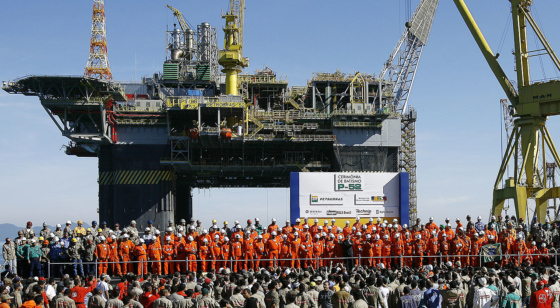
Declining Commodity Prices Brings New Challenges for Brazil
To remain competitive, Brazil will have to revise its regulations and reverse many of the reforms instituted just a few years ago.
A Daily Publication of The Dialogue
The U.S. Securities and Exchange Commission is expected to announce a draft rule this year detailing what companies must tell investors about their carbon footprint. The agency’s consideration of the subject follows November’s COP26 U.N. climate conference in Glasgow at which banks, insurers and investors, who collectively control $130 trillion in assets, said they would use their capital to achieve targets of net zero emissions in their investments by 2050. As the focus on ESG investing grows, to what extent should Latin America-based companies be required to report ESG data? How can companies best measure and disclose how they are meeting their ESG targets? What are the most important ways in which the trend toward global ESG reporting is affecting businesses in the region?
Pablo David Necoechea Porras, ESG and sustainability senior manager at Televisa: “Latin America-based companies should be required to report environmental, social and governance (ESG) data as markets are ready to assess risks and opportunities concerning a range of ESG issues. ESG analysis has risen on the public agenda, and the number of companies and institutional investors integrating ESG factors into analysis and decision-making has considerably increased. Latin America-based companies incorporate ESG factors in reporting and designing business strategies as a powerful corporate tool to measure and disclose how they are meeting their ESG targets. As a result, these companies gain a competitive advantage, strengthen internal performance and maintain a transparent relationship with stakeholders, especially investors. Companies and investors are increasing their efforts in sustainability and adopting measurable ESG practices for long-term success. Through ESG measurement tools, companies and markets get comprehensible, consistent and reliable disclosures to understand important risks and opportunities related to non-financial information to create sustainable value. Even though ESG disclosures are voluntary in Latin America, the trend toward global ESG reporting is increasing in businesses. Companies already submit their ESG reports to communicate sustainability efforts and demonstrate how their sustainability strategy aligns with their business strategy. However, the challenge is that companies can choose the standards to report data and choose ESG subjects to emphasize. The variety of ESG reporting frameworks brings a lack of comparability and inconsistency in markets. The lack of standard reporting leads to comparability problems among institutional investors. Also, the lack of assurance of ESG data and information (in most corporate sustainability reports) increases the likelihood that companies will engage in greenwashing.”
Devry Boughner Vorwerk, member of the Advisor board and CEO of DevryBV Sustainable Strategies: “The SEC is taking an ‘all agency approach’ to determine whether public company disclosures adequately inform investors on the impacts of and company practices related to climate change. In addition, in 2021 the SEC formed a Climate and ESG Task Force within its Division of Enforcement to address ‘misconduct or misstatements’ related to company disclosures on ESG. As it relates to Latin America-based companies, some may take the forthcoming SEC draft rule seriously, and others may take little notice of the SEC guidance, believing it does not affect them, especially if they are privately held. Any company in the region–public or private–that is seeking outside capital infusions, and especially the ability to adequately insure their assets, needs to focus on the SEC draft rule. The rule will set the course for companies and asset managers that are already subject to rigorous ESG disclosure requirements in the European Union. In many ways, the SEC rule could work to begin harmonizing the reporting requirements globally. Leaders of companies in Latin America should ask themselves whether they are taking the right company-wide approach to ESG. Is ESG central to their business strategy? Have they adequately mapped all the climate- and human capital-related risks across their business lines, and are they reporting accurately against those risks? Does the company have the right internal alignment across business lines and functions to efficiently and transparently address ESG risks? Once the SEC rule surfaces, companies in the region should conduct an internal gap analysis between where the company is and where the regulatory bodies are expecting them and their lenders to be. The SEC does not yet have a legislative mandate on ESG from the U.S. Congress, but that is surely coming, so be careful not to dismiss ESG as a fad. ESG is becoming codified in regulation and will surely evolve toward greater transparency, standardization, compliance and enforcement.”
Silvia M. Garrigo, senior vice president and chief ESG officer at Royal Caribbean Group: “In a global economy, regional distinctions don’t matter when it comes to ESG performance and disclosures. Issues such as workforce health and competence, supply-chain sourcing and climate change and adaptation transcend borders. A company with strong ESG performance, which also measures and discloses how it’s meeting its ESG targets, will maintain access to the global marketplace regardless of its home country. At the same time, ESG plays an integral role in the socioeconomic success of all countries, and the decarbonization of the global economy is a principal 21st century challenge. It will require bold actions and ambitious targets by the business sector and partnerships with governments, NGOs and international organizations across the globe. At the Royal Caribbean Group, we recognize the importance of a strong climate strategy and are already working with partners across and beyond industries to help us meet our goals of establishing science-based targets, delivering a net zero cruise ship by 2035, and achieving net zero emissions by 2050.”
Andrea Bonime-Blanc, CEO and founder of GEC Risk Advisory: “Like many multinational and national companies based in the United States, Europe and Asia, Latin America-based companies would be wise to participate in the ESG tsunami taking over the world. If they don’t, they may risk being left behind on a wide variety of opportunities—both financial and reputational. The financial upsides of proactively pursuing an ESG program tailored to businesses range from gaining a broader customer base (especially among younger generations increasingly involved in decision-making), better debt terms, more favorable equity pricing and cheaper insurance premiums. The reputational upsides are also numerous—ranging from appealing to important stakeholders, developing trust, competitive advantage, greater intangible brand value and protecting against litigation and fines. At this critical juncture in history, it is also imperative for businesses to be considered leaders on environmental, social and/or governance topics of importance to their company and stakeholders. Of course, there are downsides to not becoming ESG-ready or to pretending to be ESG-ready as well. If you are not ready and cannot demonstrate proper metrics to your stakeholders, your carbon footprint—for example—you may lose business, investors or trust. Likewise, if you claim to be ESG-ready or conscious and you are not, your lies will be discovered in this age of mass and social media and greenwashing accusations, and embarrassment, fines and even litigation could follow. The benefits of becoming ESG-ready far outweigh the downsides as the world is experiencing multiple, interconnected and long-term climate, social, geopolitical and cyber crises. Companies that are not paying attention to their environmental and social footprints and aren’t governed in a strategically savvy and risk-aware manner will become the losers in the long term. Latin American company boards and management teams would be wise to proactively and conscientiously start their ESG program journey—beginning with assessing where they are, where they need to be, filling the gaps, hiring the right people and implementing the program. Stakeholders—including governments anywhere you are doing business—are watching and will take notice as regulatory and legal requirements continue to rise around the world.”
 The Latin America Advisor features Q&A from leaders in politics, economics, and finance every business day. It is available to members of the Dialogue’s Corporate Program and others by subscription.
The Latin America Advisor features Q&A from leaders in politics, economics, and finance every business day. It is available to members of the Dialogue’s Corporate Program and others by subscription.
To remain competitive, Brazil will have to revise its regulations and reverse many of the reforms instituted just a few years ago.
En los últimos años, se ha observado en numerosos países un déficit en la valoración social de la docencia, acompañado de una pérdida de autoestima de los propios maestros, lo que se traduce en algunos síntomas críticos, como el decreciente número de alumnos talentosos que optan por esta profesión, o…
How the State Wrecked the Oil Sector—and How to Save It
 U.S. officials are expected to soon detail what companies must tell investors about their carbon footprint. // Image: geralt via Pixabay.com.
U.S. officials are expected to soon detail what companies must tell investors about their carbon footprint. // Image: geralt via Pixabay.com.
